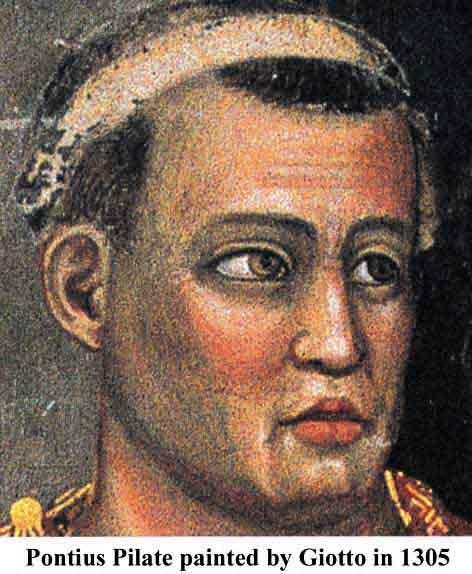
Pontius
Pilate was the procurator of Judea between 26 – 36 CE. Pontius
Pilate’s name is first named of the clan Pontii, which much is not
known about. His last name, Pilate, comes from the latin Pilate, which
is read two ways. The first thought is that his name was derived from Pileus,
which was the cap of freed slaves. The other thought is that Pilate is derived
from Pilatus, which translated is armed with javelin. Pontius
Pilate is mostly known as the man who ordered the crucifixion of Jesus,
but was much more. Little is known of Pontius Pilate's birth. There
is a legend that Pilate was born in the Scotland area, but most likely that
is false. He was the first son of Herod, the only son not killed by his
insane father. The exact date is not known.
Pilate was made the procurator (governor) of Judea by the
emperor of the Roman Empire, who was Tiberius. Pontius Pilate entered
Jerusalem at the time of the feasts, which was a major holy period, and also
at the time of when Jesus Christ was being persecuted in Jerusalem. Pilate
is described by Philo, another man involved with the government as being “inflexible,
merciless, and obstinate”. Pilate was just that, a very spineless man,
who actually would have let Jesus Christ go if it were not for the people
around who were threatening him to execute Jesus. Pilate even made some
effort to keep Jesus from being killed, but those plans were shattered once
the threats started. Pilate was described also as being willing to do
anything, but not to give any personal sacrifice toward a cause. The
Jews hated Pontius Pilate and the government, as the government
had no consideration for the Jews, and the Jews also hated the severe penalties
of Pilate’s association. Apparently, once Pilate put up gold shields representing
the deities, and Tiberius himself had to order them taken down because the
people were so outraged. Some think that if Tiberius had not done that,
Pilate would have been killed by an angry mob. Pilate had all forms of
bad reports to the government in Rome be stopped completely. Historians
also believe that Pilate may have also been a Christian, due to all of his
efforts to acquit Jesus. Many churches recognize Pontius Pilate as a Saint,
including the Greek Church and the Abyssinian church.
Pontius’ dictatorship
over Judea came to end when problems came up in Samaria. Pontius was
told he had to find the sacred vessels, which were hidden by Moses. Samarians
forces arose, and Pilate sent forces to Samaria. The Samarians then appealed
to the legate in Syria, Vitellius, and said that Pilate’s intentions were
cruel, and hated Pilate’s administration. Vitellius sent back to Rome, but
then learned of Tiberius’ death. Pilate once again was let off the hook.
Little is known of Pilate’s death. Many believe that he once again got into
trouble, this time under the emperor Caligula, and committed suicide. The
other story is that Pilate was called to Rome by Julius Caesat, and was imprisoned
by Caesar for executing Jesus. Pilate killed himself while in captivity.
There are also many stories
of how he was buried. They say that Pilate was sunk in the Tiber river, but
there were evil spirits in the river, so the body was thrown into the Rhone
river, outside of Vienne. The body also floated there, so Pilate was thrown
into a lake near Lucerne. The mountain near the lake is called Pilatus,
a sign that the lake was Pilate's final resting place. Germans also seem
to have tales of how Pilate was buried, but they have all been found false.
|
